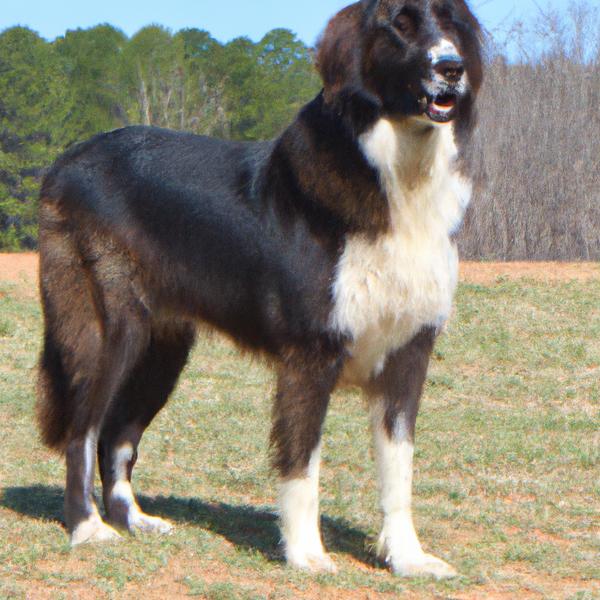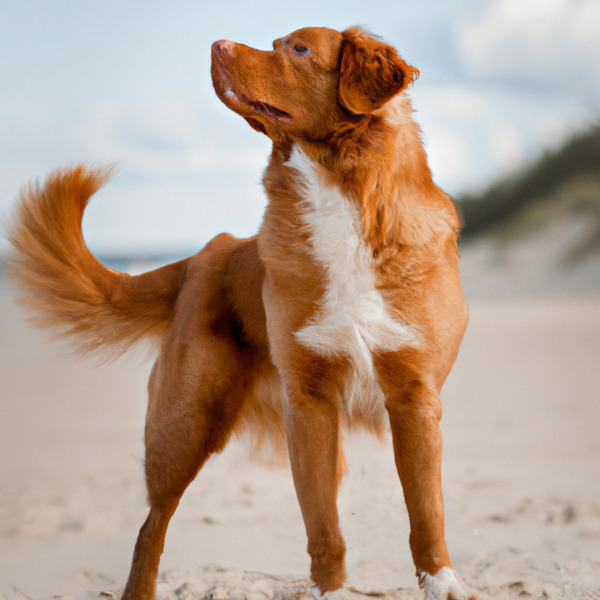Nova Scotia Duck Tolling Retriever vs. Hanover Hound: Breed Differences and Similarities
Weight Gain Potential
Which breed eats more: Nova Scotia Duck Tolling Retriever or Hanover Hound?
Both the Nova Scotia Duck Tolling Retriever and Hanover Hound breeds have an average to high tendency to gain weight if their weight is not closely monitored. It is important to maintain a balance between exercise and food intake to keep them at a healthy weight. This can be achieved by scheduling at least one daily walk and engaging in regular playtime with them.
Hypoallergenic
Are Nova Scotia Duck Tolling Retrievers or Hanover Hounds hypoallergenic, or neither?
Unfortunately, neither Nova Scotia Duck Tolling Retriever nor Hanover Hound are hypoallergenic, which may not make them the best choice for dog lovers who suffer from pet allergies.
Temperament
What are the personalities of Nova Scotia Duck Tolling Retriever and Hanover Hound dogs?
Affectionate
Courageous
Gentle
Responsive
Alert
Energetic
Playful
Gentle
Easygoing
Protective
Calm
Shedding Level
Do Nova Scotia Duck Tolling Retrievers shed more than Hanover Hounds, or which breed sheds more, Nova Scotia Duck Tolling Retrievers or Hanover Hounds?
Nova Scotia Duck Tolling Retrievers are moderate shedders, but regular brushing can reduce shedding and maintain coat health.
Hanover Hounds are low shedding dogs, requiring minimal coat care.
Watchdog Ability
Which dog breed makes a better watchdog, the Nova Scotia Duck Tolling Retriever or Hanover Hound?
Nova Scotia Duck Tolling Retrievers are decent watchdogs - they'll alert their owner if something seems amiss.
Hanover Hounds make excellent watchdogs - they're vocal and protective of their territory.
Origin
What is the origin of Nova Scotia Duck Tolling Retriever and Hanover Hound dog breeds?
Canada
Germany
Ancestry
What are the origins of Nova Scotia Duck Tolling Retriever and Hanover Hound breeds?
Cocker Spaniels, farm Collies, Irish Setters
Liam Hound, Bloodhound
Date of Birth
When were Nova Scotia Duck Tolling Retriever and Hanover Hound breeds first developed?
19th Century
17th Century
Eye Color Possibilites
What are the eye colors of Nova Scotia Duck Tolling Retriever and Hanover Hound dogs?
Hazel
Brown
Amber
Brown
Nose Color Possibilites
What are the natural nose colors of Nova Scotia Duck Tolling Retriever and Hanover Hound?
Black
Brown
Black
Coat Color Possibilites
What are the natural colors of the coat for Nova Scotia Duck Tolling Retriever and Hanover Hound breeds?
Red
Red
Brindle
Coat Length
What is the typical coat length for Nova Scotia Duck Tolling Retriever and Hanover Hound breeds?
The coat of Nova Scotia Duck Tolling Retriever and Hanover Hound dogs falls in the medium-length category.
Coat Density
What is the density of the coat of Nova Scotia Duck Tolling Retriever and Hanover Hound?
Coat Texture
What is the hair texture of Nova Scotia Duck Tolling Retriever and Hanover Hound?
Straight
Litter Size
What is the usual litter size for Nova Scotia Duck Tolling Retriever and Hanover Hound?
A Nova Scotia Duck Tolling Retriever can have a litter of 12-14 puppies on average. However, it's worth noting that the size of the litters can vary greatly. Factors that can influence litter size include the health of the mother, breeding history, and genetics.
A Hanover Hound can have a litter of 10-14 puppies on average. However, it's worth noting that the size of the litters can vary greatly. Factors that can influence litter size include the health of the mother, breeding history, and genetics.
Adaptability
Nova Scotia Duck Tolling Retrievers are highly adaptable and versatile, making them excellent companions for families and individuals of all lifestyles.
Hanover Hounds may have difficulty adjusting to changes in lifestyle and living environments, preferring consistency.
Health Issues
Between Nova Scotia Duck Tolling Retriever and Hanover Hound, which breed is more prone to health problems?
Nova Scotia Duck Tolling Retrievers typically have low vet costs due to their good health, but it's important to monitor their health and seek vet care when necessary.
The Hanover Hound breed is generally very healthy, requiring minimal vet visits. Still, it's important to keep an eye on their health and seek veterinary care when needed.
Major Concerns
What are the major health concerns for Nova Scotia Duck Tolling Retriever and Hanover Hound breeds?
Hip Dysplasia
Progressive Retinal Atrophy (PRA)
Ear Infections
Entropion
Ectropion
Hip Dysplasia
Minor Concerns
What minor health issues should be kept in mind when owning Nova Scotia Duck Tolling Retriever and Hanover Hound?
Collie Eye Anomaly (CEA)
Anesthesia Sensitivity/Allergy
Gastric Dilation Volvulus (GDV) or Bloat
Occasional Tests
What occasional tests are recommended for Nova Scotia Duck Tolling Retriever and Hanover Hound breeds?
OFA
CERF
Hearing Tests
OFA
CERF
Yearly Physical Examination
Energy
How do the energy levels of Nova Scotia Duck Tolling Retrievers and Hanover Hounds compare?
Nova Scotia Duck Tolling Retriever and Hanover Hound breeds are high-energy dogs, thus an active lifestyle suits them well.
Social Needs
Nova Scotia Duck Tolling Retriever vs Hanover Hound social needs comparison
Nova Scotia Duck Tolling Retriever and Hanover Hound have above average social needs compared to other breeds. They thrive in environments where they have a lot of interaction with humans and other dogs.
Exercise Needed
Nova Scotia Duck Tolling Retriever vs Hanover Hound exercise need comparison.
The Nova Scotia Duck Tolling Retriever and Hanover Hound breeds need significant physical activity to maintain a healthy lifestyle. They are well-suited for those who lead an active lifestyle and enjoy activities such as running, hiking, or other outdoor pursuits.
Sleeping Need
Which of the two sleeps the most/least: Nova Scotia Duck Tolling Retriever or Hanover Hound?
Nova Scotia Duck Tolling Retriever and Hanover Hound are active dogs that may not require as much sleep as other breeds. However, they still need enough sleep to stay healthy.
Drooling Tendency
Which drools more/less, Nova Scotia Duck Tolling Retriever or Hanover Hound?
Nova Scotia Duck Tolling Retriever minimally drools, ideal for those who dislike drool marks on clothing.
Hanover Hound is an average drooler, monitor for excessive drooling which may indicate health issues.
Tendency to Bark
Do Nova Scotia Duck Tolling Retrievers or Hanover Hounds bark more/less frequently?
Nova Scotia Duck Tolling Retriever and Hanover Hounds tend to bark moderately, they bark when necessary, such as to alert their owner or to communicate something. They may also bark due to certain triggers like fear, alarm, boredom, greeting, separation anxiety and compulsive barking.
Territorial
Is the Nova Scotia Duck Tolling Retriever or Hanover Hound a better guard dog?
Nova Scotia Duck Tolling Retriever and Hanover Hound breeds are generally not considered the best guard dogs as their primary trait is not defense. Although they possess the capability to defend their territory or owners, it may not be their strongest trait.
Mouthiness
Mouthiness Comparison: Nova Scotia Duck Tolling Retriever vs Hanover Hound?
Roaming urge
Nova Scotia Duck Tolling Retriever vs Labrador: Running away tendency?
Prey Drive
Nova Scotia Duck Tolling Retriever or Hanover Hound - which breed has a higher level of prey drive?
Past times
What are some enjoyable activities and ways to keep Nova Scotia Duck Tolling Retriever and Hanover Hound entertained?
Fetch, Bike ride, Dog Parks, Walk, Run
Walk, Eating Snacks, Play, Run
Activity Level
Which breed has higher energy, Nova Scotia Duck Tolling Retrievers or Hanover Hounds?
Nova Scotia Duck Tolling Retriever and Hanover Hound are high-energy dogs that require a lot of mental and physical exercise. Without proper stimulation and attention, these breeds can become problematic. If you're considering these breeds, be prepared to invest time and effort in their exercise and training.
Tolerance of being left alone
Walks per Week
How many miles should Nova Scotia Duck Tolling Retriever or Hanover Hound walk each week?
There's really no limit to how far you walk your dog as long as they're comfortable. For Nova Scotia Duck Tolling Retriever, it's at least 10 miles / week. Just remember to build distance and stamina gradually over time.
There's really no limit to how far you walk your dog as long as they're comfortable. For Hanover Hound, it's at least 12 miles / week. Just remember to build distance and stamina gradually over time.
Activity per Day
Do Nova Scotia Duck Tolling Retrievers or Hanover Hounds require more exercise?
Both Nova Scotia Duck Tolling Retriever and Hanover Hound typically require a minimum of 60 minutes of exercise each day. The exercise can be spread throughout the day and may involve high-energy activities like walking, running, and playing.
Grooming
Which breed is easier to maintain in terms of grooming, Nova Scotia Duck Tolling Retrievers or Hanover Hounds?
Nova Scotia Duck Tolling Retriever and Hanover Hound are breeds of dogs that are known for their low grooming needs.
Brushing Frequency
What is the recommended brushing frequency for Nova Scotia Duck Tolling Retriever and Hanover Hound dogs?
Nova Scotia Duck Tolling Retriever and Hanover Hound should be brushed at least once a week. Of course, you can give them more frequent brushes if you find that they are still shedding a lot.
Brushing Tools
What brushing tools are used for Nova Scotia Duck Tolling Retrievers and Hanover Hounds?
Pin Brush
Dematter
Comb
Nail Clipper
Slicker Brush
Nail Clipper
Cups
How much food should be given to Nova Scotia Duck Tolling Retriever or Hanover Hound in cups?
For an average 44-51 pound (20 - 23 kg) Nova Scotia Duck Tolling Retriever feed 2.3 cups daily. But, keep in mind, the amount you feed is going to be dependent on the quality of the food you are feeding.
For an average 80-100 pound (36 - 45 kg) Hanover Hound feed 2.8 cups daily. But, keep in mind, the amount you feed is going to be dependent on the quality of the food you are feeding.
Daily Cost
Which breed has a higher daily cost, Nova Scotia Duck Tolling Retriever or Hanover Hound?
The average cost of a Nova Scotia Duck Tolling Retriever is somewhere $1.70 - $2.00 per day.
The average cost of a Hanover Hound is somewhere $2.10 - $2.70 per day.
Monthly Cost
Which breed has a higher monthly cost, Nova Scotia Duck Tolling Retriever or Hanover Hound?
The average per month expenses of a Nova Scotia Duck Tolling Retriever is between $48 - $63. This makes an average of $576 - $756 per year. It will be on the higher side when the dog is still small because it will need more frequent visits to the vet, shots.
The average per month expenses of a Hanover Hound is between $55 - $73. This makes an average of $660 - $876 per year. It will be on the higher side when the dog is still small because it will need more frequent visits to the vet, shots.
Intelligence
Comparing Intelligence: Nova Scotia Duck Tolling Retrievers vs Hanover Hounds
Nova Scotia Duck Tolling Retriever has below average obedience intelligence, but they excel in understanding human emotions.
Hanover Hounds are average in obedience intelligence but have a high IQ and may cause trouble if left unsupervised.
Sensitivity Level
How do Nova Scotia Duck Tolling Retriever and Hanover Hound compare in sensitivity?
Nova Scotia Duck Tolling Retrievers have average emotions and adapt well to different situations.
This breed is sensitive and requires gentle handling and a calm home environment.
Affection Dependance
Which is the more affectionate dog breed: Nova Scotia Duck Tolling Retriever vs Hanover Hound?
Apartment Friendly
Which breed is more apartment-friendly: Nova Scotia Duck Tolling Retriever or Hanover Hound?
Nova Scotia Duck Tolling Retrievers are good apartment dogs as long as they get enough exercise and stimulation outside of the apartment.
Hanover Hounds can do well in apartments with enough exercise and time outside, but a small yard would be ideal.
Child Friendly
Do Nova Scotia Duck Tolling Retrievers or Hanover Hounds have a friendlier temperament towards children?
The typical characteristics of Nova Scotia Duck Tolling Retriever and Hanover Hound indicate that this breed of dog is an ideal companion for kids and makes them family pets. Their gentle and protective nature and calm mentality make them gel along quickly with the younger humans.
Senior-friendly
Which dog is more suitable as a pet for the elderly - Nova Scotia Duck Tolling Retriever or Hanover Hound?
Cat Friendly
Do Nova Scotia Duck Tolling Retriever or Hanover Hound breeds have a better compatibility with cats?
Nova Scotia Duck Tolling Retrievers are average in their friendliness toward cats and tend to do well with them, especially if raised together.
Hanover Hounds are somewhat cat friendly and can be trained to get along with cats.
Dog Friendly
Which breed is more sociable with other dogs: Nova Scotia Duck Tolling Retriever or Hanover Hound?
Nova Scotia Duck Tolling Retrievers are generally very friendly towards other dogs, with a happy and affectionate temperament.
Hanover Hounds are friendly and active companions, and can be good family pets, though their friendliness towards other dogs may vary.
Pet friendly
How do Nova Scotia Duck Tolling Retriever or Hanover Hound dogs interact with other pets?
Stranger Friendly
Which breed is more friendly with strangers: Nova Scotia Duck Tolling Retriever or Hanover Hound?
They can be below average friendly around strangers, being keen of eye and sharp of tongue, and very quick to announce strangers at the door. Once the visitor comes in, some Nova Scotia Duck Tolling Retriever and Hanover Hound may be friendly and outgoing, while others can be standoffish or suspicious towards strangers.
Playfulness
Which breed is more playful between Nova Scotia Duck Tolling Retriever and Hanover Hound?
Nova Scotia Duck Tolling Retriever and Hanover Hound are known to be highly playful dogs. So if you're not up for all that, think about adopting slightly older Nova Scotia Duck Tolling Retriever and Hanover Hound for a mellower experience.
Trainability
How do the trainability levels of Nova Scotia Duck Tolling Retrievers and Hanover Hounds compare?
Nova Scotia Duck Tolling Retrievers are popular for their ease of training and quick learning ability.
Hanover Hounds may require more time and patience to learn commands, but with consistency, they can be trained.
Compare Nova Scotia Duck Tolling Retriever with other breeds

Mastapeake
Nova Scotia Duck Tolling Retriever vs Mastapeake

Belgian Tervuren
Nova Scotia Duck Tolling Retriever vs Belgian Tervuren

Hanover Hound
Nova Scotia Duck Tolling Retriever vs Hanover Hound

Plott Hound
Nova Scotia Duck Tolling Retriever vs Plott Hound

Cursset
Nova Scotia Duck Tolling Retriever vs Cursset

Italian Greyhound
Nova Scotia Duck Tolling Retriever vs Italian Greyhound

Miniature Ausseippet
Nova Scotia Duck Tolling Retriever vs Miniature Ausseippet

Yorkshire Terrier
Nova Scotia Duck Tolling Retriever vs Yorkshire Terrier

Jack Russell Terrier
Nova Scotia Duck Tolling Retriever vs Jack Russell Terrier

Schnorgi
Nova Scotia Duck Tolling Retriever vs Schnorgi

Engatzu Spaniel
Nova Scotia Duck Tolling Retriever vs Engatzu Spaniel

Cane Corxer
Nova Scotia Duck Tolling Retriever vs Cane Corxer
